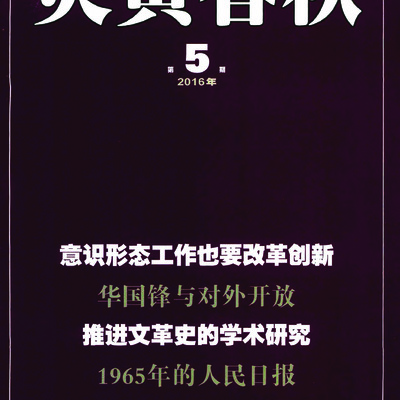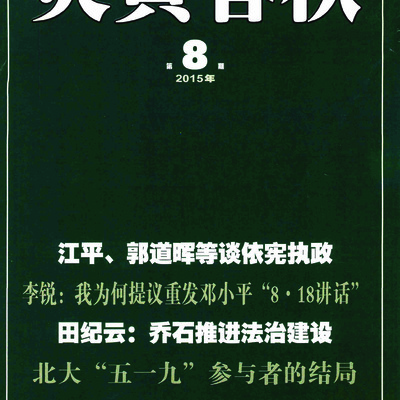
Storm under the Sun
In May 1955, Mao Zedong launched a nationwide campaign to “purge the counterrevolutionary clique of Hu Feng,” which is widely regarded in academic circles as the first large-scale Literary inquisition after the founding of the People's Republic of China.
Hu Feng, the central figure of the campaign, was a poet, critic, and translator. Inspired by Lu Xun, who was regarded as the most influential Chinese writer associated with the May Fourth Movement, Hu devoted himself to the revolution in pursuit of people's liberation. Considered the successor of Lu Xun's New Literature Movement, he was the head of the propaganda of the League of Left-Wing Writers, and founded the magazines July and Hope, through which he trained a large number of progressive left-wing poets and writers.
However, Hu became a target of Mao Zedong's campaign because he upheld the critical spirit of Lu Xun and insisted that writers should be independent rather than mouthpieces of the Communist Party. According to official statistics, during the campaign against Hu Feng, 92 people were arrested, 62 were subjected to solitary confinement, 73 were suspended from their jobs, and 2,100 were implicated. Although only three people, including Hu Feng, were formally sentenced, many labeled key Hu Feng elements endured decades of imprisonment and reeducation through labor.
Director Peng Xiaolian's father, Peng Baishan (then a member of the League of Left-Wing Writers and head of the propaganda of the Shanghai Municipal Party Committee), was also subjected to severe persecution, and in 1968 was beaten to death for being the “spokesman of the Hu Feng counterrevolutionary group within the Party. Starting in 2003, Peng Xiaolian and S. Louisa Wei visited more than 20 survivors of the anti-Hu Feng campaign. They also spent more than five years filming and producing Storm under the Sun. Through audio recordings of Hu Feng, interviews with survivors, family members of the victims, and scholars, the film presents from beginning to end how the anti-Hu Feng campaign unfolded, as well as the immense physical and psychological trauma that it imposed on the victims and their families.
As the first film to document the anti-Hu Feng campaign, Storm under the Sun tells the stories of these lesser-known left-wing poets and writers and how they participated in the revolution through their literary work. At the same time, the film demonstrates how the multiple political campaigns against intellectuals during the Mao era were one and the same, unified under the overarching goal of controlling thought and eradicating dissent.
S. Louisa Wei
S. Louisa Wei, documentary filmmaker. After studying in Canada in the 1990s and receiving a PhD in Film from the University of Alberta and an MA in Comparative Literature from Carleton University, Wei joined the School of Creative Media at the City University of Hong Kong in 2001 to teach film theory and production. She has been making documentaries since 2003. Her feature and TV documentary works include Cui Jian: Rocking China (2006), Storm under the Sun (2009, co-produced, directed and written with Pang Xiaolian), Golden Gate Girls (2014), Wang Shiwei: The Buried Writer (2016), Havana Divas (2018), Writing 10000 Miles (2019), and A Life in Six Chapters (2022) . She is also the author of several monographs, including Esther Eng: Ocean-crossing Film and Women Pioneers , Woman’s Film: Dialogues with Chinese and Japanese Female Directors, and Hu Feng: Poetic Ideals and Political Storms.
Peng Xiaolian
Peng Xiaolian (June 26, 1953 - June 19, 2019), film director, screenwriter and author. A native of Chaling, Hunan Province, Peng was born in Shanghai. Her father, Peng Baishan, was persecuted to death after being labeled a Hu Feng element in 1955. In 1969, Peng was sent to Jiangxi Province as a sent-down youth and stayed there for nine years. In 1978, she was admitted to the Beijing Film Academy; after graduation, she was assigned to the Shanghai Film Studio. She was considered one of China’s fifth-generation directors, along with Chen Kaige, Zhang Yimou and others. In 1989, on a Rockefeller Scholarship, Peng went to New York University's School of Cinema to study for a Master of Fine Arts and, after graduating in 1996, she returned to Shanghai to continue her career as a director and also started independent film production. She died on 19 June 2019 in Shanghai due to illness.
Peng's films are mostly about Shanghai and feature female protagonists. Her major works, including Shanghai Women, Shanghai Story, and Shanghai Rumba, won several domestic and international film awards. In addition to feature films, she also made the documentary Storm under the Sun, influenced by her parents' experiences during the campaign against Hu Feng in the 1950s. As a writer, Peng authored several fiction and non-fiction works, including Beautiful Shanghai, Four Seasons of Childhood, The Confusion of Idealism, among others.
















